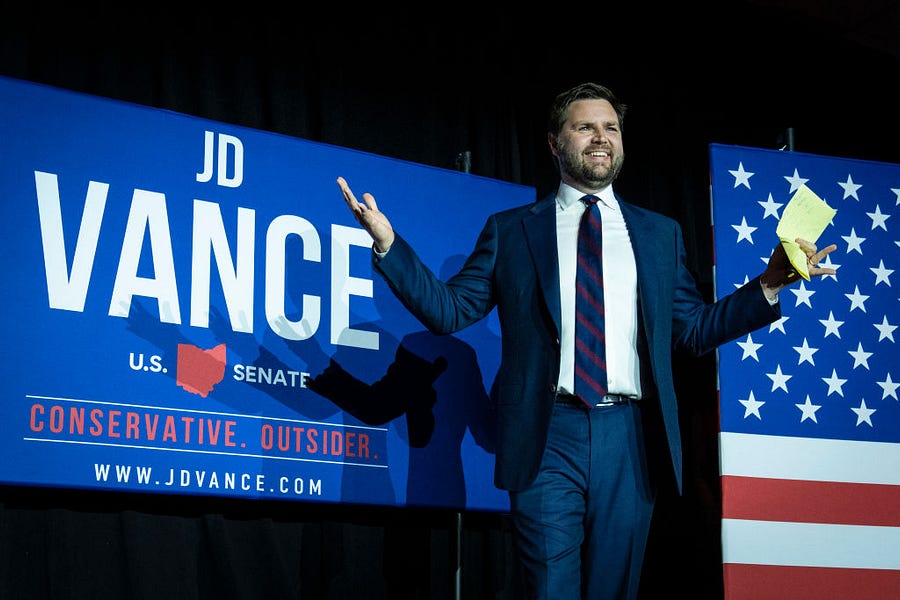Sarah’s out this week. That means Audrey and Andrew were given free rein to write about every political junkie’s favorite question this midterm cycle: Who will control the Senate next year?
Senate Leadership Fund Comes to the NRSC’s Rescue
Last week, Politico reported that the National Republican Senatorial Committee is cutting $10 million worth of ad buys in the key Senate battlegrounds of Pennsylvania, Arizona, Wisconsin, and Nevada three months before Election Day. Senate Minority Leader Mitch McConnell doesn’t seem to be particularly thrilled by the news, to put it mildly. “I think there’s probably a greater likelihood the House flips than the Senate,” he said in his home state of Kentucky Thursday. “Senate races are just different—they’re statewide.”
Then came the real kicker. “Candidate quality has a lot to do with the outcome.”
As the Morning Dispatch pointed out earlier today, McConnell’s comments are a jab at the Trump-endorsed Republican Senate nominees this midterm cycle who are struggling to raise money and broaden their appeal to swing voters. Their ranks include Blake Masters in Arizona, J.D. Vance in Ohio, and Dr. Mehmet Oz in Pennsylvania.
Oh, and there’s Georgia’s GOP Senate nominee Herschel Walker. The former football star has been a gaffe machine on the trail, offering frequently bewildering policy comments on issues from air quality (“our good air decided to float over to China’s bad air, so when China gets our good air, their bad air got to move”) to Democratic climate legislation (“A lot of money it’s going to trees. Don’t we have enough trees around here?”). Some of his controversies have been merely goofy, as when he lied to his own campaign about how many children he’s fathered. Others have been more sinister, like his ex-wife’s allegation he had once threatened her by putting a gun to her head.
But now just 11 weeks out from Election Day, what can be gained from a party leader’s admission that his own party isn’t doing so hot? “It’s a kick in the pants in a way for some of these candidates that have to try to run general election campaigns and not primary campaigns,” said Jessica Taylor, the Senate and governors editor for the Cook Political Report who also interpreted McConnell’s remarks as a wake up call to donors. “They’re getting killed in money, they’re getting killed in some of these contests when it comes to fundamentals.”
Even while McConnell warns about the possibility that the GOP might not take the Senate in November, he’s doing something about it. Enter the Senate Leadership Fund (SLF), a McConnell-aligned super PAC that in April reserved more than $140 million in TV and radio ads in key battlegrounds, including Wisconsin, North Carolina, and Nevada. “I don’t read too much into these [NRSC ad] cancellations because you do have the Senate Leadership Fund that is far more flush,” Taylor added. Those SLF ads will provide a much-needed buffer for the NRSC, which boasted a record $173 million in fundraising this midterm season but is now strapped for cash with just $23.2 million as of July 31.
But the SLF still has $104.8 million in the bank, and is wasting no time trying to make every dollar count. Over the weekend, the super PAC announced a $28 million TV and radio ad investment in Ohio, a reliably red state where Democratic nominee Tim Ryan carries a narrow polling but significant fundraising lead over J.D. Vance. That follows an announcement earlier this month that the super PAC will throw an additional $9.5 million into Pennsylvania, bringing its total Keystone State money dump to $34 million.
As struggling GOP candidates continue their eleven-week sprint toward Election Day, NRSC Chairman Rick Scott is spending his recess vacationing in Italy, per new reporting from Axios.
John Wood, We Hardly Knew Ye
Many in the GOP breathed a sigh of relief earlier this month when Missouri Attorney General Eric Schmitt triumphed over former Gov. Eric Greitens in the Show-Me State’s Republican Senate primary. Without the headache of Greitens’ lurid personal scandals to worry about in the general, there was no need to fret about the possibility of losing what should be a safe red seat.
As it turns out, John Wood agrees. Weeks before the primary, the former U.S. attorney and senior January 6 committee investigator launched an independent bid for the seat, running as a conservative who had not sworn fealty to former President Donald Trump and rejecting in particular his ongoing lies about the validity of the 2020 election. Wood’s campaign was buttressed by a $20 million Super PAC pledge from former Sen. John Danforth, a powerful Republican in the state.
But on Tuesday, Wood suspended his campaign, stating that Schmitt’s capture of the nomination had left him without a viable lane to run in.
“Since the primary, and since it turned out to be Eric Schmitt rather than Eric Greitens, it’s become evident that there’s not a path forward where I’m likely to win,” Wood told The Dispatch in a call.
The acknowledgment was a sharp reversal from the arguments Team Wood had previously deployed. Wood said earlier this month that Schmitt, Greitens, and also-ran Rep. Vicky Hartzler were “really running the same campaigns … all trying to be as far right as possible.” Earlier this year, Danforth described the three major GOP candidates as “indistinguishable.” (Danforth declined to comment for this article.)
On the question of the 2020 election specifically, this was a fair characterization. While the three candidates offered differing levels of enthusiasm for Trump’s stolen-election narrative on the trail, none of them elected to push against that narrative. Even Hartzler, the least gung-ho of the three on the topic, told The Dispatch last month that “I don’t think we’ll ever really know” whether Biden was legitimately elected, “because there were so many discrepancies.” Schmitt, for his part, threw his weight as attorney general behind Texas AG Ken Paxton’s failed 2020 lawsuit attempting to throw out the voting results of several states that voted for Joe Biden.
But it’s also true that a character-touting moderate who waxes poetic about the political virtues of Rep. Liz Cheney is a tough sell for Republicans and Republican-leaning voters in the present moment. If the goal is to highlight a character contrast, it’s hard to argue with Wood’s assessment that relatively abstract fact-based arguments about 2020 make for a harder sell than they would have been with Greitens, a philanderer who has been accused of sexual violence and domestic abuse.
“I understand that politically [Schmitt] doing anything to distance himself from Donald Trump could lead President Trump to exact retribution on him,” Wood told The Dispatch Tuesday. “So I understand that he’s in a difficult political position. But I think just in terms of the morally correct position, he should say that there’s no evidence that the 2020 election was stolen and that he’s not gonna try to overturn the 2020 presidential election if he gets into the Senate.”
Abortion Ad Wars in Colorado
For much of this cycle, the midterm environment has been defined by a set of issues that make Democrats wince: sky-high consumer prices, the chaotic U.S. withdrawal from Afghanistan, and Joe Biden’s difficulty marshaling the votes to pass various pieces of his legislative agenda. But this summer, Democrats have found an issue that seems, on balance, to significantly favor their side for voters: preserving access to legal abortion.
It’s no surprise then that abortion is the focus of Democratic Sen. Michael Bennet’s first attack ad released last week, in which a narrator tells Colorado voters that his Republican challenger Joe O’Dea “would’ve voted to confirm Trump’s Supreme Court Justices who overturned Roe v. Wade.”
O’Dea hit back with a 30-second ad of his own that accused Bennet of misrepresenting his views. “My dad supports same sex marriage, he will defend a woman’s right to choose, he will protect access to contraception for all women,” his daughter tells voters. (In a recent interview with The Dispatch, O’Dea said he “wasn’t in favor of the overturning” of Roe v. Wade and that he opposes efforts to restrict abortion “early on in the pregnancy or for rape and medical necessity,” though he made clear he strictly opposes taxpayer-funded abortions and requiring religious institutions to perform abortion-related procedures.)
From Bennet’s perspective, abortion seems to be an effective messaging strategy in state Biden won in 2020 by 12 points, considering how many Republicans in even ruby-red Kansas voted overwhelmingly to protect abortion rights in a recent ballot measure.
Taylor said the Cook Political Report moved Colorado’s race last week from likely Democrat to Lean Democrat to indicate that they see the race as competitive, although Bennet still has a clear advantage as an incumbent in a blue-leaning state.
But as Republican strategist Dave Kochel puts it, a rising political tide lifts all boats. “Biden is pretty unpopular in Colorado, and if you’ve got a wave, it puts a lot of states in play that wouldn’t otherwise be in play,” Kochel said.
A Hallway Interview Worth Sharing
We caught up with Democratic Sen. John Hickenlooper of Colorado in the U.S. Capitol late last month to get his take on whether he thinks O’Dea is gaining any ground in his race against Bennett ahead of November. And FWIW, he seemed taken aback by The Dispatch’s characterization of O’Dea as a “pro-choice moderate” in his bid against Bennet. “I didn’t realize he was a pro-choice moderate,” Hickenlooper said in a July 26 interview. “I missed that.”
Pat Toomey Doesn’t Know What to Make of Doug Mastriano
It’s always fun to watch the role that retiring senators play in the primary and general election races to fill their seat. Some are eager to handpick their successor, as retiring GOP Sen. Richard Shelby did with his former chief of staff Katie Britt, who beat Rep. Mo Brooks in a June 23 runoff by 26 points. But others are keenly aware of their high disapproval rating and/or are checked out of state politics entirely, and would rather sit back and let the process play out without their involvement.
Pro-impeachment GOP Sen. Pat Toomey sits somewhere in the middle. He waited until late July to tell The Dispatch that he’ll support Mehmet Oz in his bid to defeat John Fetterman. But that belated endorsement came more than two months after the nail-biter primary contest between Oz and Republican challenger Dave McCormick, which ended in a recount and ultimate concession from McCormick.
What’s been even more entertaining to watch is the strange role Toomey is playing in Pennsylvania’s gubernatorial race. He’s spent months dodging questions from reporters about whether he’ll support Republican nominee Doug Mastriano, a fiery candidate who chartered buses to the Capitol on January 6 and wants to ban all abortions in Pennsylvania if elected.
On July 28, Mastriano tweeted a photo of himself standing in front of the Capitol Hill Club near the U.S. Capitol, captioned: “Meeting with our congressional delegation in Washington DC.” Four days later, every House Republican representing Pennsylvania endorsed Mastriano’s campaign, with the exception of moderate Rep. Brian Fitzpatrick.
Toomey didn’t seem to have scored an invite. “I did not attend,” Toomey told The Dispatch in the U.S. Capitol a week later. “I don’t recall being invited. But it’s possible that invitation came and was not brought to my attention, but that’s unlikely.”
He wasn’t even aware that nearly every member of his party’s congressional delegation had endorsed Mastriano. “This is the first I’m hearing about it,” Toomey said of the near unanimous endorsement. “I haven’t decided what—what I’m going to do about that race.” (Toomey’s non-answers on Mastriano come four months after a pre-primary interview with the Times Leader in which the senator praised two of Mastriano’s Republican challengers, including Lou Barletta— “I like Lou”—and Bill McSwain, whom he called “an impressive candidate.)
Other Senate Races We’re Keeping a Close Eye On
-
Florida: For a while, no one in D.C. seemed to be talking about GOP Sen. Marco Rubio’s reelection campaign. But then came last week’s poll from the University of North Florida that showed Democratic nominee Val Demings leading Rubio by 4 percentage points among registered voters “who said they would vote in the general midterm election” (48-44.) It’s an outlier poll. But it’s a reminder that Florida is still a swing state, albeit a red-leaning one.
-
Nevada: The Cook Political Report rates Catherine Cortez Masto as the Senate’s “most endangered Democratic incumbent.” Like Bennet, she’s leaning in on abortion. And she’s getting quite a bit of fundraising help from pro-choice organizations including WOMEN VOTE!, a super PAC associated with EMILY’s List that has already spent $3.9 million opposing her Republican opponent Adam Laxalt, per FEC filings updated July 31. (Side note: Check out this funny TV ad from Cortez Masto, which takes a hit at Laxalt for “flunking out of college” and profiting off of his family connections and sounds an awful lot like the opening credits song from the TV show Succession.)
-
New Hampshire: A recent poll from St. Anselm College puts Democratic Sen. Maggie Hassan’s approval rating at an abysmal 44 percent. She’s anxiously awaiting next month’s Republican primary to see who she’ll face in November. (Read more about that upcoming primary here.)
-
North Carolina: Republican Ted Budd, an early example this cycle of a candidate put over the top in his primary by a boost from Trump, is in a dead heat with former state Supreme Court Chief Justice Cheri Beasley in this reddish-purple state. Beasley has had a major cash advantage, outspending Budd by roughly $5.5 million since January 2021 while still sitting on a $4.8 million war chest, far ahead of Budd’s $1.8 million. Meanwhile, Trump’s legal issues have given Budd some logistical fits—a major July 15 rally had to be postponed so Trump could sit for a deposition in a New York civil probe that day. But Budd still has time to pull ahead in this state Trump won by a point and change in 2020.
-
Utah: Independent candidate Evan McMullin is launching an interesting general election bid against GOP Sen. Mike Lee, who has a clear polling advantage. Pro-impeachment GOP Sen. Mitt Romney is playing a weird role by choosing to remain neutral in the race. “I indicated that about a year ago, which is they’re both close friends of mine, so I won’t be making any formal endorsements,” Romney reiterated in a brief Capitol interview with The Dispatch earlier this month.
-
Washington: Six-term Democratic Sen. Patty Murray may be favored to win in this blue-leaning state, but she faces an impressive challenge from GOP nominee Tiffany Smiley. Check out her ads here.
-
Wisconsin: GOP incumbent Ron Johnson isn’t a stranger to tight races—he became the first Republican to win a Senate race in more than two decades when he toppled incumbent Russ Feingold in 2010, then beat Feingold in a rematch in 2016. But the state electorate has soured on him somewhat since his last contest, in part due to his fervent embrace of Trump and his attempts to decertify the 2020 election in particular. Recent polls give a small but significant edge to his opponent, Lt. Gov. Mandela Barnes.







Please note that we at The Dispatch hold ourselves, our work, and our commenters to a higher standard than other places on the internet. We welcome comments that foster genuine debate or discussion—including comments critical of us or our work—but responses that include ad hominem attacks on fellow Dispatch members or are intended to stoke fear and anger may be moderated.
With your membership, you only have the ability to comment on The Morning Dispatch articles. Consider upgrading to join the conversation everywhere.